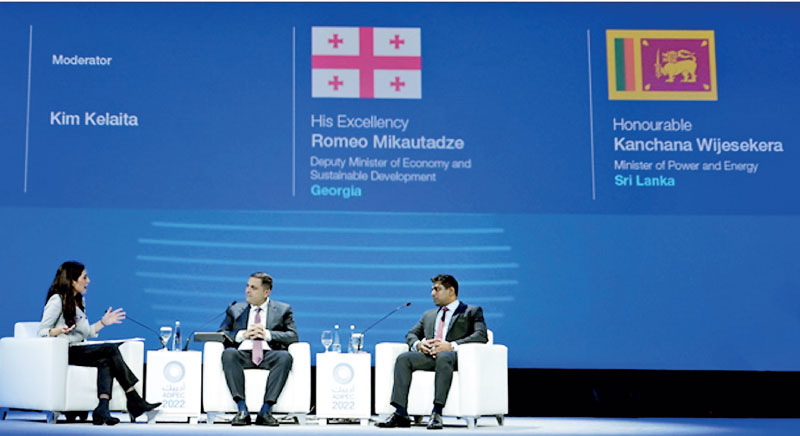Friday Feb 20, 2026
Friday Feb 20, 2026
Wednesday, 2 November 2022 04:01 - - {{hitsCtrl.values.hits}}

Sri Lanka is still struggling to afford international fuel prices and to procure quantities required to cater to the demand, Power and Energy Minister Kanchana Wijesekera said.
He made these remarks speaking at a panel discussion on the second day of the Abu Dhabi International Petroleum Exhibition and Conference 2022, ahead of the COP27.
Global oil executives and chiefs of national oil companies also gather in Abu Dhabi to discuss their response to the energy crisis that has been exacerbated by years of underinvestment in the industry’s infrastructure worldwide and exacerbated this year by geopolitics.
The meeting takes place ahead of COP27, where global leaders will gather in Egypt on 8 November to examine progress since COP26.
“It’s been a tough ten months for Sri Lanka. We have run out of energy imports and it is due to financial constraints. We are still seeking financial assistance from oil-producing countries, and have not yet secured any aid, apart from an existing deal with India. It is very difficult for us to access the letter of credit (LCs) or give any other guarantees on payments, given the economic crisis,” he added.
Focusing on the opportunities presented by the energy transition, he noted that the economic crisis has enabled the Government to amend some of the key policies, to allow private suppliers to enter into the petroleum industry.
Minister Wijesekera also said that Sri Lanka is seeking to privatise the oil industry, but has yet to make a deal.
Noting that a national fuel management program was initiated, he said it helped to reduce consumption by 40% and is also in discussions with the International Monetary Fund (IMF) for financial aid.
The Minister said imports of Russian oil and fuel are also still under consideration, whilst adding that a diesel shipment from China is expected by the end of this month.
“It does not matter where it is coming from, as long as it is affordable for Sri Lanka,” he said.
Minister Wijesekera also outlined that Sri Lanka has fast-tracked its plans to use renewable energy at 70/30 by 2030.